View in other NatureServe Network Field Guides
NatureServe
Montana
Utah
Wyoming
Idaho
Wisconsin
British Columbia
South Carolina
Yukon
California
New York
Low Arctic Cinquefoil - Potentilla hyparctica
Other Names:
Potentilla nana, Potentilla flabellifolia var. emarginata
State Rank Reason (see State Rank above)
Rare in Montana, where it is currently only from a couple collections from the Beartooth Mtns. The remote, high-elevation habitat should greatly minimize the potential for any negative impacts to the viability of the species in the state. Accurate estimates of population levels are lacking.
General Description
Low arctic cinquefoil is a perennial with stems 5-20 cm tall that arise from a branched rootstock covered by old reddish-brown leaf bases. The basal leaves have long petioles and blades with three coarsely-toothed leaflets; the stems have a few small, sessile leaves or leaf-like bracts and 1-3 flowers borne on short stalks. Foliage is loosely covered by long hairs that remain on the plant as it ages. The flowers are 1.5-2 cm in diameter and have a green 5 lobed calyx with small appendages on each lobe, 5 yellow heart-shaped petals, and many stamens and pistils. Each pistil has a single slender style attached at or near the top of the ovary.
Phenology
Flowering in late July-early August.
Diagnostic Characteristics
Distinguished from other perennial species of Potentillain Montana by having basal leaves that are strictly trifoliate, and foliage that is sparsely long hairy rather than white wooly beneath.
Species Range
Montana Range
Range Descriptions
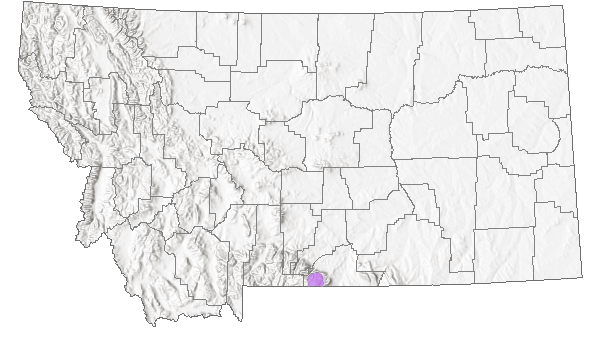
 Native
Native
Range Comments
Alaska and the Yukon south to British Columbia and Alberta, east to Labrador. In Wyoming, known only from the N Wind River Range in Sublette and Fremont counties.
Observations in Montana Natural Heritage Program Database
Number of Observations: 9
(Click on the following maps and charts to see full sized version)
Map Help and Descriptions
Relative Density
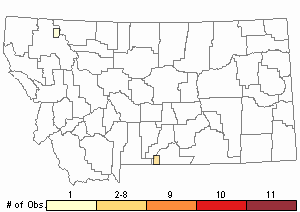
Recency
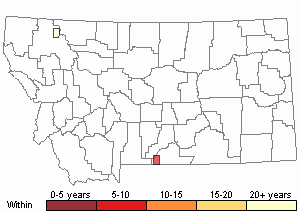
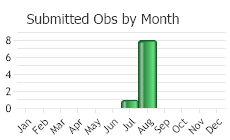
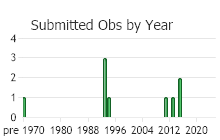
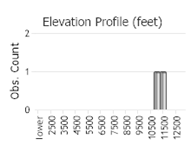 (Observations spanning multiple months or years are excluded from time charts)
(Observations spanning multiple months or years are excluded from time charts)
Habitat
Moist turf in the alpine zone.
National Vegetation Classification System Groups Associated with this Species
Alpine
Alpine - Vegetated
Wetland and Riparian
Alpine Riparian and Wetland
Ecology
POLLINATORS The following animal species have been reported as pollinators of this plant species or its genus where their geographic ranges overlap:
Bombus bifarius,
Bombus fervidus,
Bombus frigidus,
Bombus rufocinctus,
Bombus occidentalis,
Bombus pensylvanicus,
Bombus impatiens, and
Bombus flavidus (Thorp et al. 1983, Wilson et al. 2010, Colla and Dumesh 2010, Colla et al. 2011, Koch and Strange 2012, Koch et al. 2012, Williams et al. 2014).
Stewardship Responsibility
Threats or Limiting Factors
STATE THREAT SCORE REASON
Threat impact not assigned because threats are not known (MTNHP Threat Assessment 2021).
References
- Literature Cited AboveLegend:
 View Online Publication
View Online Publication Colla, S., L. Richardson, and P. Williams. 2011. Bumble bees of the eastern United States. Washington, DC: USDA Forest Service, Pollinator Partnership. 103 p.
Colla, S., L. Richardson, and P. Williams. 2011. Bumble bees of the eastern United States. Washington, DC: USDA Forest Service, Pollinator Partnership. 103 p. Colla, S.R. and S. Dumesh. 2010. The bumble bees of southern Ontario: notes on natural history and distribution. Journal of the Entomological Society of Ontario 141:39-68.
Colla, S.R. and S. Dumesh. 2010. The bumble bees of southern Ontario: notes on natural history and distribution. Journal of the Entomological Society of Ontario 141:39-68. Koch, J., J. Strange, and P. Williams. 2012. Bumble bees of the western United States. Washington, DC: USDA Forest Service, Pollinator Partnership. 143 p.
Koch, J., J. Strange, and P. Williams. 2012. Bumble bees of the western United States. Washington, DC: USDA Forest Service, Pollinator Partnership. 143 p. Koch, J.B. and J.P. Strange. 2012. The status of Bombus occidentalis and B. moderatus in Alaska with special focus on Nosema bombi incidence. Northwest Science 86:212-220.
Koch, J.B. and J.P. Strange. 2012. The status of Bombus occidentalis and B. moderatus in Alaska with special focus on Nosema bombi incidence. Northwest Science 86:212-220. MTNHP Threat Assessment. 2021. State Threat Score Assignment and Assessment of Reported Threats from 2006 to 2021 for State-listed Vascular Plants. Botany Program, Montana Natural Heritage Program, Helena, Montana.
MTNHP Threat Assessment. 2021. State Threat Score Assignment and Assessment of Reported Threats from 2006 to 2021 for State-listed Vascular Plants. Botany Program, Montana Natural Heritage Program, Helena, Montana. Thorp, R.W., D.S. Horning, and L.L. Dunning. 1983. Bumble bees and cuckoo bumble bees of California (Hymenoptera: Apidae). Bulletin of the California Insect Survey 23:1-79.
Thorp, R.W., D.S. Horning, and L.L. Dunning. 1983. Bumble bees and cuckoo bumble bees of California (Hymenoptera: Apidae). Bulletin of the California Insect Survey 23:1-79. Williams, P., R. Thorp, L. Richardson, and S. Colla. 2014. Bumble Bees of North America. Princeton, NJ: Princeton University Press. 208 p.
Williams, P., R. Thorp, L. Richardson, and S. Colla. 2014. Bumble Bees of North America. Princeton, NJ: Princeton University Press. 208 p. Wilson, J.S., L.E. Wilson, L.D. Loftis, and T. Griswold. 2010. The montane bee fauna of north central Washington, USA, with floral associations. Western North American Naturalist 70(2): 198-207.
Wilson, J.S., L.E. Wilson, L.D. Loftis, and T. Griswold. 2010. The montane bee fauna of north central Washington, USA, with floral associations. Western North American Naturalist 70(2): 198-207.
- Additional ReferencesLegend:
 View Online Publication
View Online Publication
Do you know of a citation we're missing? Lesica, P., M.T. Lavin, and P.F. Stickney. 2012. Manual of Montana Vascular Plants. Fort Worth, TX: BRIT Press. viii + 771 p.
Lesica, P., M.T. Lavin, and P.F. Stickney. 2012. Manual of Montana Vascular Plants. Fort Worth, TX: BRIT Press. viii + 771 p. Lesica, P., M.T. Lavin, and P.F. Stickney. 2022. Manual of Montana Vascular Plants, Second Edition. Fort Worth, TX: BRIT Press. viii + 779 p.
Lesica, P., M.T. Lavin, and P.F. Stickney. 2022. Manual of Montana Vascular Plants, Second Edition. Fort Worth, TX: BRIT Press. viii + 779 p. Lesica, P., P. Husby, and S. V. Cooper. 1998. Noteworthy collections: Montana. Madrono 45:328-330.
Lesica, P., P. Husby, and S. V. Cooper. 1998. Noteworthy collections: Montana. Madrono 45:328-330.
- Web Search Engines for Articles on "Low Arctic Cinquefoil"





